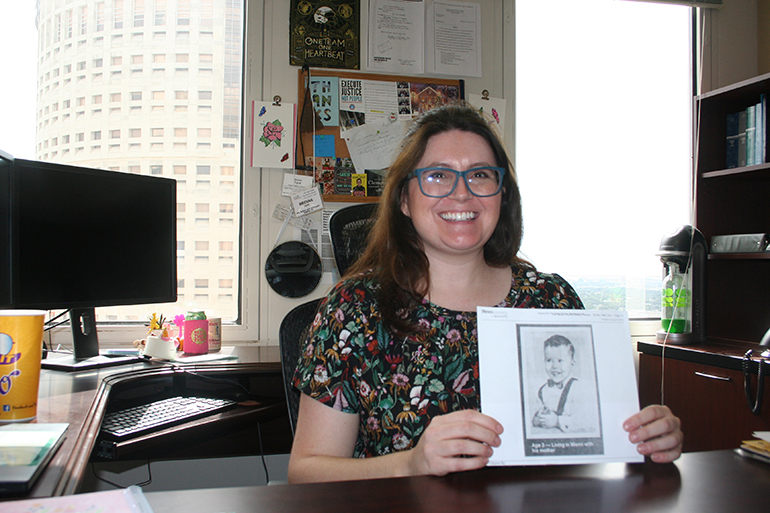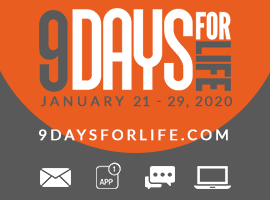By Jean Gonzalez - Florida Catholic - Orlando

Photographer: JEAN GONZALEZ | FC
Sitting in her office at the Federal Public Defender Office in Tampa, attorney Brenna Egan holds up a photocopy of a picture taken of Bobby Joe Long when he was 3-years-old. Egan said the photo represents her client's humanity, who was once a little boy.
TAMPA | The first time Brenna Egan met her client, Bobby Joe Long, in person was also the last time she saw him alive.
After speaking with him over the phone for a month, the lawyer with the Federal Public Defender’s Office in Tampa visited him at Florida State Prison in Starke May 22, 2019, a day before his execution for the murder of Michelle Denise Sims. The visit was not a contact visit, as a thick piece of glass separated them. Before the visit ended, the Georgetown University Law Center graduate and her fellow law teammates placed their hands against the glass, and he did the same on the other side.
It was their final goodbye to a man they knew committed many violent crimes, but they still fought to save from the execution chamber.
Egan, a devout Catholic who grew up in Orlando and attends Sacred Heart Parish in downtown Tampa, has a distinct view of the death penalty — from the perspective of representing a client who was convicted of horrible crimes. Some people might refer to her clients as monsters who committed monstrous acts and deserve monstrous punishments. Passionate as a capital punishment opponent, she works to look past the actions of her client and reveal his or her humanity to stop the actual death penalty from happening.
And she gains confidence to move in that direction because of the teachings of the Catholic Church, and the example of its shepherds, including Pope Francis, who approved a new revision of a paragraph in the Catechism of the Catholic Church that deemed the death penalty as “inadmissible.”
“Just as the Church teaches, just because you committed the most heinous of crimes doesn’t mean your inherent dignity is gone,” Egan said, adding that it is encouraging that citizens state a lack of support for the death penalty because of the real and documented possibility of executing innocent people. But citizens, especially people of faith, are called to take that reasoning a step further.
“There are innocent people executed and innocent people who are on death row. And that is absolutely true and horrifies me about the death penalty. But I also think it says a lot about us if we can stand up even if we know we have the right person, we know what they did was bad, yet we still say, ‘No. We are not going to contribute to this cycle of violence.’”
SERIAL RAPIST, SERIAL KILLER
As a lawyer, Egan, 31, serves the Capital Habeas Unit, which represents state death-sentenced individuals in federal habeas and state clemency proceedings. In the case of Bobby Joe Long, Egan and her colleagues did not dispute the crimes he committed. He was a serial rapist and a serial killer who pleaded guilty to killing eight women — for seven of which he received life sentences while receiving the death sentence for one. His guilt was unquestionable.
However, his mental capacity was not. While on active duty in the military, Long suffered what Egan described as a “devastating and severe” traumatic brain injury. Although a disabled veteran, he received little support for the trauma, as studies about traumatic brain injuries were nonexistent or in their infancy.
“My client was a loving family man before this injury changed him forever,” Egan explained. “We know now that the severity of the brain injury and the areas of the brain with damage can, without rehabilitation and treatment, cause maladaptive behaviors, including paranoia, hypersexualization, lack of impulse control and aggression.”
“Our brains are built in a way to filter impulses. Mr. Long had no rehabilitation and therapy to deal with his injuries, despite the hospital and his ex-wife noticing the changes in him right away,” Egan continued. “His case is so sad. What happened to him — his injuries — didn’t excuse his actions, but it changed so many lives. So many lives could have been different, including his own, if he got treatment so long ago.”
As part of her avocation, Egan is against capital punishment, which she believes is not a deterrent to crime, is more expensive than imprisonment, and does not protect society, especially if an option of life in prison is available. Application of the death penalty is impacted by issues of race, economy and social standing. In the south, its roots can be traced back to the days of legal slavery.
MENTAL ILLNESS, ‘REVOLVING DOOR’
Her understanding of the death penalty has evolved over time. In her younger years, she thought about being a prosecutor, but law school and clerking for a judge opened her eyes to a different path as she examined cases and trends. She recognized how clients with mental illness would get stuck in this “revolving door of getting prosecuted” instead of getting appropriate mental help.
Then, when she took a job at a law firm in 2016, her first case was as a member of a team representing a client who faced the death penalty in a federal case. As with Long, the team did not dispute their client’s guilt; they worked in a resentencing trial to spare him capital punishment. Egan researched the case for three or four months before she first spoke to the client over the phone. She said the case itself was “life changing.”
“My first introduction was the grizzly facts of what he did,” said Egan, who over time became the member of the team who best got along with the client. “I saw his humanity. I could really see that transition in myself and I think that was useful in helping others get to that point.”
At the resentencing, her client received the death penalty, and is awaiting execution at the federal prison in Terre Haute, Indiana. It was a tough moment for Egan. On the day of the verdict, she received a call from him.
“He wanted to see how I was doing,” she recalled. “(People) say this person is a monster but on what was the worst day of his life, he was checking to see how I am because he knew it would affect me a lot.”
RETRIBUTION, VENGEANCE
The case also taught Egan about attitudes surrounding the death penalty. The resentencing trial included several Catholic jurors who agreed with the death sentence. Egan discovered through post-interviews and verdict sheets that the decision was based on “retribution and vengeance.”
“One question I asked (during jury selection) was when mercy is earned or given,” she said. “I feel strongly that mercy is given, but a lot of people believe it is something to be earned. That is a challenge to overcome.”
Egan had been working the case for Bobby Joe Long well before Gov. Ron DeSantis signed his death warrant in April. During that time, the team not only got to know Long, but also members of his family, which included children and grandchildren. The team was working to secure a resentencing hearing based on mental incapacity from brain trauma. One of their tasks was securing funding and court approval to have up-to-date brain scans for Long.
But then came that fateful Tuesday afternoon. Egan’s coworker, who was the leader of the team, had just left for vacation, and Egan was alone in the office. She opened an email at about 4:45 p.m. and her heart dropped. A date had been set to kill Long by lethal injection.
Reality set in. All the work the team had done was fast-tracked to a 30-day window — the shortest of any other warrant in Florida — until the execution was scheduled.
Despite their efforts, the team was not able to save Long’s life.
“Our last visit was a good visit,” Egan recalled. “We tried to keep things light. He had a lot of worries about his family and about his daughter.”

One of his daughters and granddaughter were in Starke for the execution. But on Long’s final day, he requested to be alone with a spiritual advisor, a pastor his son knew. It was not an unusual request, because that last day can be emotionally traumatic for loved ones of the executed.
“It was a decision out of care and concern,” Egan said. “He didn’t want his family to be upset or to be around people who were going to kill him or who hated him.”
As for his legal counsel, only one member of the team was allowed in the witness room. But the rest of the crew stayed for the execution. So Egan and her colleagues joined Long’s family to wait on the grassy field outside Florida State Prison.
And they were not alone.
PRAYER VIGIL
Egan witnessed how buses pulled up in front of the prison to join them: Catholics who travel from different parts of the state to participate in a prayer vigil on the day of executions. And on May 23, those prayerful opponents of state-sanctioned murder served as reminders that they also recognize the humanity of the man to be executed.
“The prayer service was really special. It was beautiful. It meant so much to Bob’s daughter to have all of those people supporting her and saying we don’t want your dad to die,” said Egan, who knew the vigil would occur and passed that information along to her client. “She was surrounded by love. And it helped Bob to know that. It helped us, too, since we couldn’t go in the prison.”
Music was sung. Prayers were offered for the victims, their families, Bobby Joe Long, his family, the prison guards, the governor. Then came the hardest part of the service.
“It was my boss who got the phone call that the last appeal was denied by the Supreme Court,” Egan recalled. “I cried when we got that call. My boss had to be the one to tell Bob’s daughter. We knew the execution was going to happen, but she was still holding on to hope.”
Prayers and singing continued until the execution happened. Egan found solace in the fact that her coworker had been in the witness room being “the face of Jesus” for Long.
Although Egan did not work the case for Gary Ray Bowles, who was executed Aug. 22, 2019, she knew others who did. She watched a livestream of a prayer service for him.
Since then, the governor has signed another warrant scheduling the 100th execution in Florida. James Dailey, who has been on death row for more than 30 years, was scheduled to die Nov. 7. His case is under the review with the Innocence Project of Florida, which believes he is innocent, and that the killer is already serving life in prison.
Although Egan is not currently working under the pressure of a warrant, she continues her habeas work. When she is at church, she lights candles for crime victims and those scheduled for execution. In her office is a painting by her client in Terre Haute. She also has a photocopy of a picture of Bobby Joe Long when he was 3 years old. She loves the photo because, to her, it reminds her he was a little boy who had a mother, before violence overtook his life. After his execution, he wanted his brain donated to science.
“I hope I can share Bob’s humanity. I told him I would never forget him,” she said. “My mission is to see humanity in people that society says are inhuman.”

